|
Dear Friend:
Our story today is an echo. It’s not quite the same as the one told by Booker T. Washington in 1895, but it’s close.

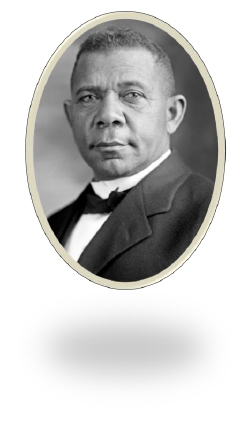
President of the Tuskegee Institute (now Tuskegee University) from 1880 – 1915, Washington gave many speeches and left for posterity many precious gems. Among them, this:
“We went into slavery a piece of property; we came out American citizens. We went into slavery pagans; we came out Christians. We went into slavery without a language; we came out speaking the proud Anglo-Saxon tongue. We went into slavery with slave chains clanking about our wrists; we came out with the American ballot in our hands.”
Now, as he stood before the Cotton States and International Exposition in Atlanta, Washington was about to deliver the speech that would transform his life and catapult him into the nation’s conscience as one of its leading black spokesmen.
It became known as his Atlanta Compromise Speech.
Years later, in one very influential mind (i.e., that of one Theodore Roosevelt) Washington’s speech still percolated. It would eventually boil over in 1901 when his 2nd autobiography: Up From Slavery was published.
Unable to dismiss the greatness before him, President Roosevelt, pricked to the core, found relief only by inviting Washington to dine with him and his family at the White House.
He was the first black man so honored, but it came with a price.
Among Washington’s detractors were Southern politicians like the future Governor of Mississippi James K. Vardaman, and Senator Benjamin Tillman of South Carolina. Both exploded when they learned of the invitation.
Vardaman described the White House as "so saturated with the odor of the nigger, that the rats have taken refuge in the stable," and declared "I am just as much opposed to Booker T. Washington as a voter as I am to the cocoanut-headed, chocolate-colored typical little coon who blacks my shoes every morning. Neither is fit to perform the supreme function of citizenship."
Not to be outdone, Tillman chimed it: "The action of President Roosevelt in entertaining that nigger will necessitate our killing a thousand niggers in the South before they will learn their place again." (Lusane, Clarence, 23 January 2013: The Black History of the White House).
It would be 30 years before the next black man would be invited to dine at the White House.
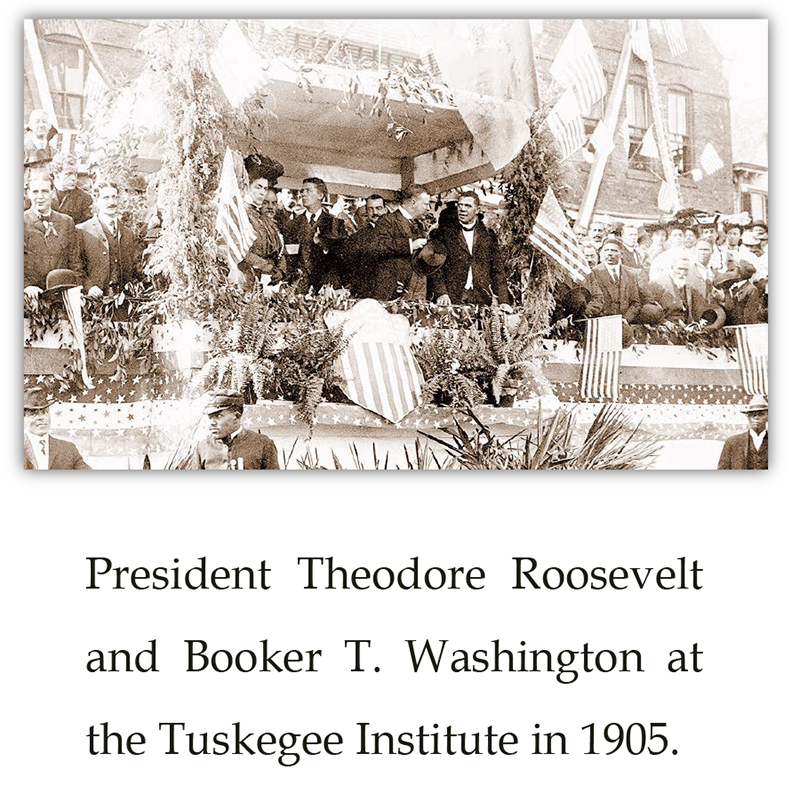
In spite of the blatant racism that erupted against him, Washington, son of a Virginia slave known only as Jane, would go on to become the friend of several very wealthy men ― men such as Julius Rosenwald, Andrew Carnegie, John D. Rockefeller, and William Howard Taft ― men who’d come to abhor slavery, and who rallied to the plight of former slaves.
In this Atlanta speech, however, Washington may have been thinking more of one man, certainly not a millionaire, a man he never met ― yet revered―a giant who’d passed off the scene of action three decades earlier, and to whom he owed his very freedom.
In the brevity of this speech, maybe he could at least try to emulate him.
It was a simple speech. In it Washington told the story of a ship in the Atlantic that was in dire straits. Having run out of water, the mariners feared for their lives.
You know what happened, don’t you?
You don’t?
Well, I’ll let Washington tell it. Here are his words.

“A ship lost at sea for many days suddenly sighted a friendly vessel. From the mast of the unfortunate vessel was seen a signal:
“Water, water. We die of thirst.”
The answer from the friendly vessel at once came back: “Cast down your bucket where you are.”
A second time, the signal, “Water, send us water!” went up from the distressed vessel. And was answered: “Cast down your bucket where you are.”
A third and fourth signal for water was answered: “Cast down your bucket where you are.”
The captain of the distressed vessel, at last heeding the injunction, cast down his bucket and it came up full of fresh, sparkling water from the mouth of the Amazon River.”
The mariners didn’t know it, but the force of the Amazon emptying into the Atlantic pushed fresh water out to sea for miles. Recently, I went on line to find out just how many miles.
Here’s what Wikipedia had to say about this.
 |
“The Amazon is responsible for about 20% of the Earth's fresh water entering the ocean. The river pushes a vast plume of fresh water into the ocean. The plume is about 400 kilometres (250 mi) long and between 100 and 200 kilometres (62 and 124 mi) wide. The fresh water, being lighter, flows on top of the seawater, diluting the salinity and altering the color of the ocean surface over an area up to 2,500,000 km2 (970,000 sq mi) in extent. For centuries ships have reported fresh water near the Amazon's mouth yet well out of sight of land in what otherwise seemed to be the open ocean.” |
 |
I was thinking maybe 5 or 10 miles, but fresh water pushed 250 miles out to sea is absolutely incredible!
That’s wider than my entire homeland, Jamaica, West Indies, which can only boast 146 miles from the eastern end of the island to the westernmost point.
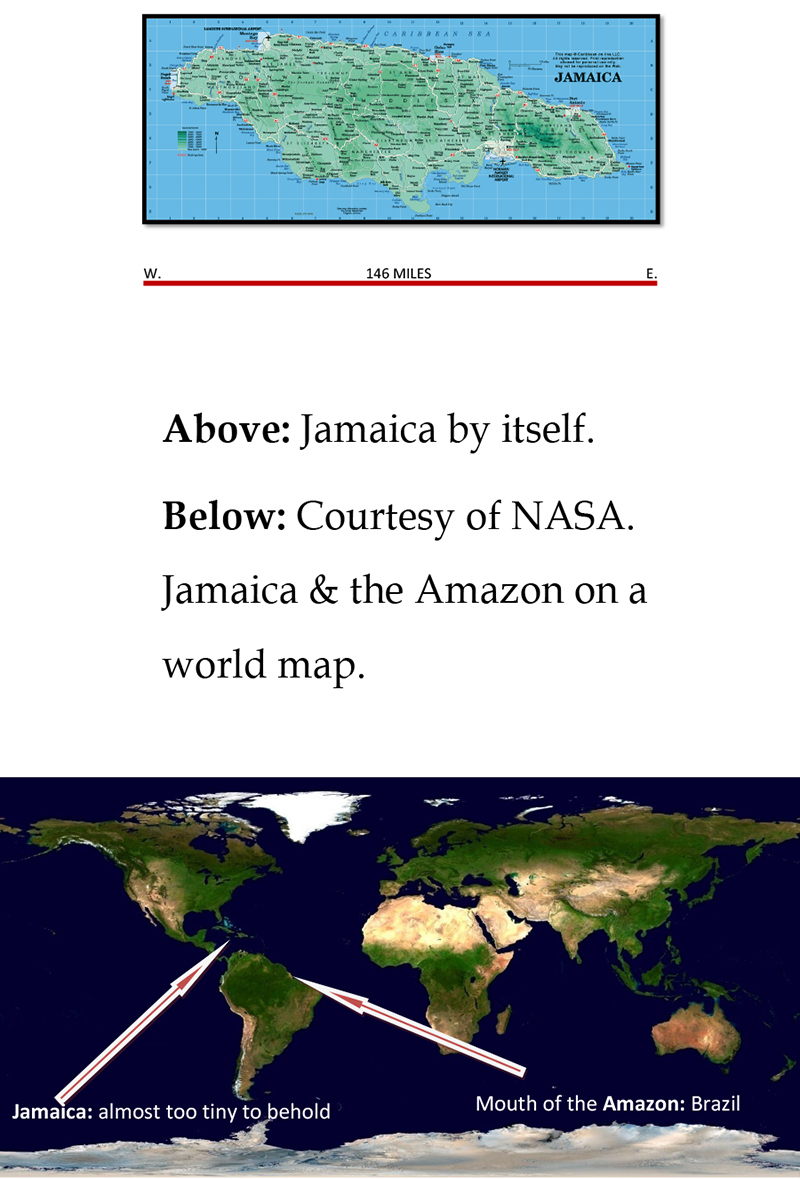
With that little bit of geography under our belts, I suspect there is much truth to Washington’s story. In fact, I think evangelist George Vandeman also used this illustration in one of his books.
Well why bring it up this morning?
Because though it might not have been discerned by our readers, this principle: “Dip down where you are,” is the principle that’s been driving our ministry since the turn of the year.
It’s a new strategy for us, so let me explain.

When we set about to reprint The Great Controversy in 1990, it took quite a bit of work, but we did it!
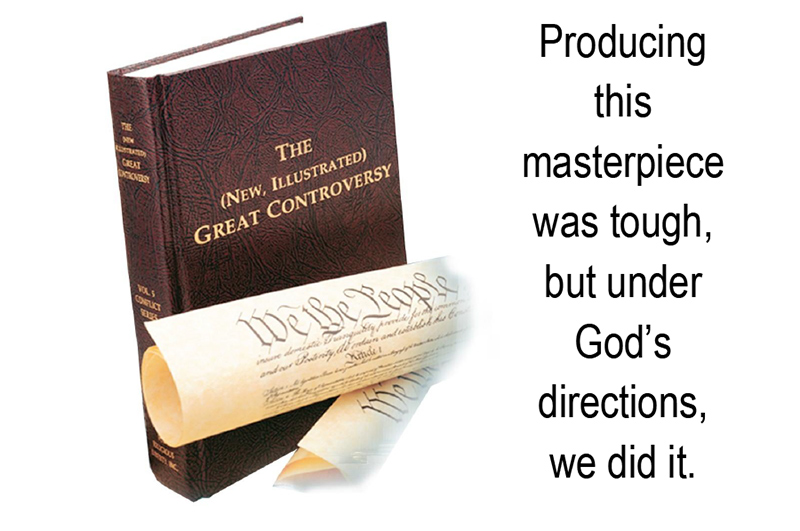
The edition we’re working on today is 20 times more difficult, at least.
- More pictures to be taken (hundreds more).
- More detailed captions for each.
- More artistic skill to be employed in the layout.
- More funds required for each page.
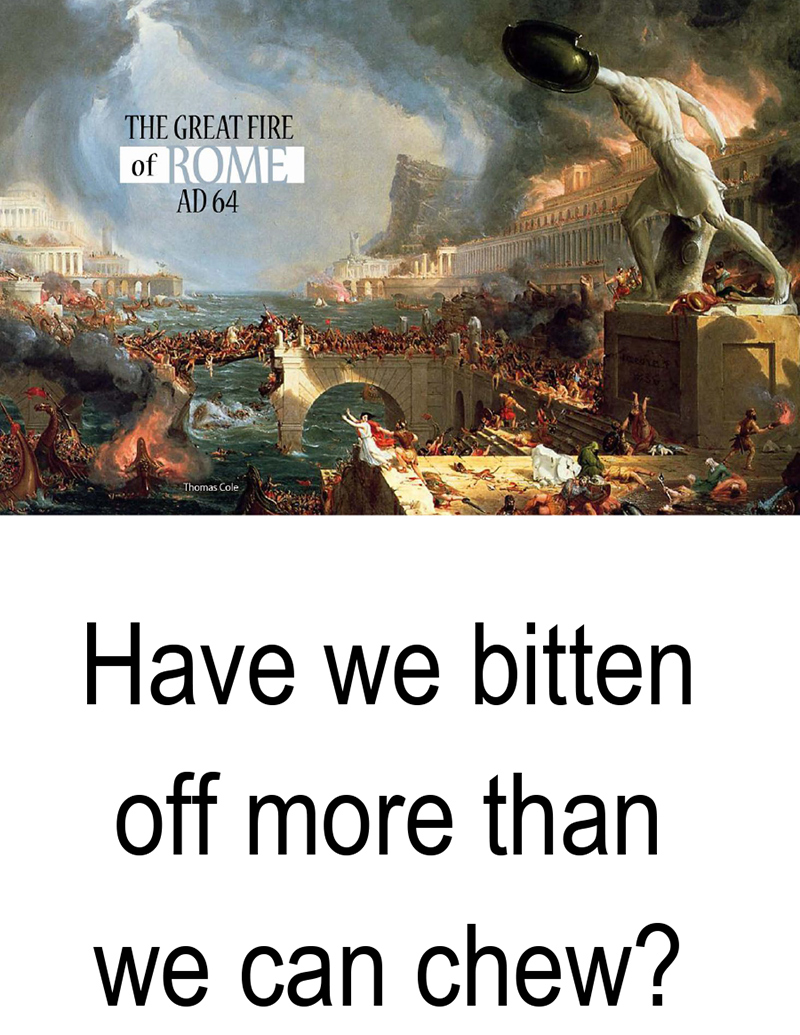
For the past year it appeared that we might have indeed bitten off more than we could chew though. The going was slow, painfully slow.
Luther had his Wartburg, where he could sit for a year with Erasmus' Greek New Testament, study at his leisure and eventually produce the New Testament in German.
Oh how I wish I had the same – a place to secrete myself for a year or two, while doing nothing but working on our book. But how can I, with a ministry to run, staff to be paid, script to be written, and videos to be produced?
Truth be known, though, Luther’s was a much longer project than a mere year. It took him 12 more years before he’d translate the entire Bible into German. But I don’t believe our planet has all that time.
So what should I do?
But for the promises of God, the determination He’s written upon my soul, and the exhortation that we’ll need to pray like Elijah in these last days, I might have given up long ago.
Here’s the inspired commentary about Elijah that steadies my knees and pushes me forward. It’s found in Prophets & Kings.

 |
“Throughout the day he had unflinchingly performed the will of God and had revealed his implicit confidence in the prophecies of God's word; and now, having done all that was in his power to do, he knew that Heaven would freely bestow the blessings foretold. The same God who had sent the drought had promised an abundance of rain as the reward of rightdoing; and now Elijah waited for the promised outpouring. In an attitude of humility, “his face between his knees,” he interceded with God in behalf of penitent Israel.
“Again and again Elijah sent his servant to a point overlooking the Mediterranean, to learn whether there were any visible token that God had heard his prayer. Each time the servant returned with the word, “There is nothing.” The prophet did not become impatient or lose faith, but continued his earnest pleading. Six times the servant returned with the word that there was no sign of rain in the brassy heavens. Undaunted, Elijah sent him forth once more; and this time the servant returned with the word, “Behold, there ariseth a little cloud out of the sea like a man's hand.”
This was enough. Elijah did not wait for the heavens to gather blackness. In that small cloud he beheld by faith an abundance of rain; and he acted in harmony with his faith, sending his servant quickly to Ahab with the message, “Prepare thy chariot, and get thee down, that the rain stop thee not.”
It was because Elijah was a man of large faith that God could use him in this grave crisis in the history of Israel. As he prayed, his faith reached out and grasped the promises of Heaven, and he persevered in prayer until his petitions were answered. He did not wait for the full evidence that God had heard him, but was willing to venture all on the slightest token of divine favor. And yet what he was enabled to do under God, all may do in their sphere of activity in God's service; for of the prophet from the mountains of Gilead it is written: “Elias was a man subject to like passions as we are, and he prayed earnestly that it might not rain: and it rained not on the earth by the space of three years and six months.” James 5:17.
Faith such as this is needed in the world today—faith that will lay hold on the promises of God's word and refuse to let go until Heaven hears. Faith such as this connects us closely with Heaven, and brings us strength for coping with the powers of darkness.” Prophets & Kings, pages 156, 157.
|
 |
Elijah inspires me. Thanks to him (and Jacob), clinging to God’s promises has become second nature to me, the bedrock of our ministry, our instinctive response to mockery and duress.
Elijah reminds us that even though God has promised His blessings, there are times when we still have to search diligently for them.
We still have to ask, seek, knock, plead, and, at times, as Jesus put it in Luke 13:24 ― “agonizomai” ― i.e., agonize with God for His blessings!
Here’s how Mrs. White put it:
“Those who are unwilling to deny self, to agonize before God, to pray long and earnestly for His blessing, will not obtain it.” The Great Controversy, page 621.
Trouble is, here at our ministry’s headquarters, we’ve done all this since we started praying about publishing a completely new and re-worked 2nd edition. And what do we have to show for it?
Little!
During these three or four years we’ve barely raised enough funds to keep our noses above water.
Looking even further back ― say, 2 ½ decades further back ― I can still see the faithfulness and grace of Almighty God, for it’s through that grace that we’ve been able to come as far as we have since we first set out to print what we prayed would be “the best edition of The Great Controversy that the world would ever see.”
| Q. |
What should we do now, therefore, that funds for this new edition have slowed to a trickle? Call it quits?
|
| A. |
How can we, when we remember how God has led us in the past? No, we will not quit. Rather we’re absolutely committed to going forward ― however slowly we may be compelled to go ― until God shows us the way to His treasures. |
 |
“When the Lord turned again the captivity of Zion, we were like them that dream. Then was our mouth filled with laughter, and our tongue with singing: then said they among the heathen, The Lord hath done great things for them. The Lord hath done great things for us; whereof we are glad. Turn again our captivity, O Lord, as the streams in the south. They that sow in tears shall reap in joy. He that goeth forth and weepeth, bearing precious seed, shall doubtless come again with rejoicing, bringing his sheaves with him.” Psalm 126.
|
 |
As I’ve said over the years: quitting is just not part of our vocabulary.
- I believe God!
- I trust God!
- Make no mistake ― like Joseph cleaning Egyptian toilets for 13 years ― I still trust Him!
By the way, didn’t Sergio Garcia just win the Masters last Sunday? After 19 years on the PGA tour and 73 tries, didn’t he just pull off his first Major victory?

So many heartaches along the way too. He might have had ample reason to quit, but instead set us yet another example of absolute determination. Do you think he’s sorry he persevered?
Friend, I might not be a golf enthusiast, but determination I absolutely adore. Our day will come too!

So much for Garcia.
What are we to do now? I mean, even a novice can see time running out.
| Q. |
In addition to waiting on God, what can we do in the scarce time left to us? What can we do that’s different from anything we’ve already done?
|
| A. |
We can do what Booker T. Washington admonishes us to do.
“Dip down where you are.”
|
That’s the answer that’s come back to my soul as we’ve come to this, our most recent standstill. It’s sort of like God asking Moses:
“What is that in thine hand?”
Moses’ answer: “A rod.” Exodus 4:2.
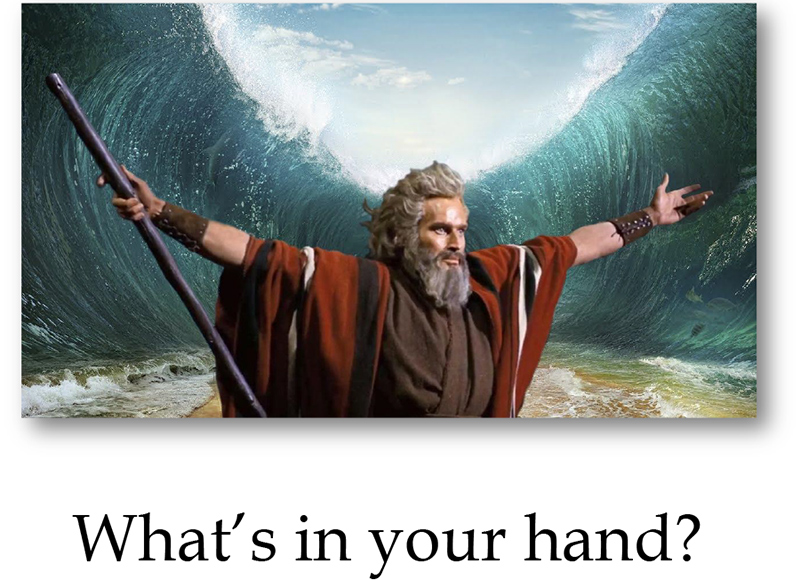
With God’s Spirit and angels attending that rod, Moses did exploits in Egypt.
“But lift thou up thy rod, and stretch out thine hand over the sea, and divide it: and the children of Israel shall go on dry ground through the midst of the sea.” Exodus 14:16.
So much for Moses.
What does our ministry have in its hands?
| Q. |
What do we have that could possibly generate the funds we need to publish the first 1,000,000 copies of the revised edition of The (New, Illustrated) Great Controversy?
|
| A. |
I’ve searched and searched, scratched my head and prayed, and all that’s hit me over the past month or two is this: we’ve got fresh footage of our missionaries in Jamaica working ― footage shot from December through February.
|
That’s about all we have.
And don’t laugh either. Didn’t Jesus use five loaves and two fishes to feed a multitude? Didn’t He use Moses’ rod to confound Pharaoh?
 |
“But God hath chosen the foolish things of the world to confound the wise; and God hath chosen the weak things of the world to confound the things which are mighty; And base things of the world, and things which are despised, hath God chosen, yea, and things which are not, to bring to nought things that are: That no flesh should glory in his presence.” 1 Corinthians 1: 27 – 29.
|
 |
Using our missionaries to draw attention to The Great Controversy may seem such an unlikely lure, but I believe it can be done.
To the world they may be foolish, weak, base, despised and dead, but God has promised to use just such persons (or things) to accomplish His purposes.
As for those who are likely to react to these young black workers in much the same way that Vardaman and Tillman reacted to Booker T. Washington’s invitation to the White House ― later for them!
Watch God!
Watch God, I say!
Interestingly, this footage is mostly due to our video producer too. He just never stopped ― never stopped remonstrating with me. Here’s what he’d say.
“David, look how many times you’ve been to Denham Town, yet you’ve come back with not so much as one photograph. I’ve heard you talk about the place, but nobody’s seen anything.”
Part of the explanation for that paucity is the fact that I didn’t want to get him killed. Oh he’d have loved to come to Jamaica, but people in West Kingston don’t willingly allow their photographs to be taken by strangers.
Men have been killed for less in Denham Town.
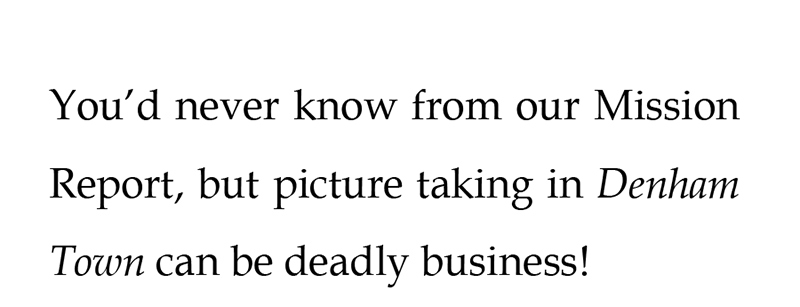
Well, after not taking any pictures since we helped bury our friend “Longhead” in 2006 ― and yielding totally to our producer ― we recently hired a local camera crew and started judiciously documenting the work of our missionaries.
These workers, I knew, wouldn’t object to their pictures being taken; nevertheless I was a bit nervous as we set out on foot with a cameraman and sound operator, who, at times, would be before us, and at times behind … blatantly, obviously, visible.
Q. Did we meet with any threats?
A. None!
While it is true our team is from the community (and equally true that some people might have recognized me, and known what I and our ministry are all about), the ease with which we filmed surprised me.
Though we couldn’t see them, clearly the angels of God were with us too! So where exactly did we go with those cameras?
- We filmed our workers on the streets of Denham Town, interacting with normal people.
- We filmed them at the market, purchasing fresh produce for the elderly.
- We filmed them as they cooked.
- We filmed them as they distributed Steps to Christ.
- We filmed them as they fed the elderly.
- We filmed them out at Port Royal, eating with the families of men who’d been murdered in the community
- And, on a second occasion, we filmed them as they toured an old fort that survived Port Royal’s earthquake of 1692.
Was this what God wanted us to use?
Was I to use our upcoming mission report to point people to The Great Controversy?
If so, how?
If the impression on my mind was from God, then the challenge would be how to weave this footage into a report that would not only open eyes as to the existence of The (New, Illustrated) Great Controversy, but soften hearts that could help us fund its re-publication.
It would all boil down to how we used our pen for this task.
How were we to intertwine The Great Controversy into a mission report revolving around the street ministry of missionaries in Denham Town, Jamaica?
Q. Could it even be done?
A. Yes it could!
I believe we’ve begun this process successfully too!
Look again at Part 1 of our report and see how many times The Great Controversy is mentioned. I may have added one or two more as I ad-libbed during the recording, but the script called for Ellen White’s classic to be mentioned seven times during Part 1.
In the upcoming section, which we sandwiched between Part 1 & Part 2, The Great Controversy is mentioned 16 times.
Sixteen times we mention this book as we expound on the unwelcome trilogy rolling around in my mind:
- The destruction of Sodom and Gomorrah as the great prototype;
- The destruction of the “Sodom of the New World,” Port Royal, as a facsimile, and
- The destruction of San Francisco as the final warning.
Q. Did I just say the destruction of San Francisco?
A. Yes! I said: “the destruction of San Francisco as the final warning!”


Friend, I believe Part 1 of our mission report has already softened the ground. There’s much more there about The Great Controversy than even I intended.
- Somebody grabbed hold of my mind, I believe.
- Somebody grabbed hold of my pen.
The next two parts will deepen those sacred impressions already made – I’m sure of it! I’ve said it before and I’ll say it again. I believe that when non-Adventists in particular are confronted with these five points in our report:
- The destruction of Sodom and Gomorrah, because of the sin of sodomy.
- The destruction of the “Sodom of the New World,” the old pirate city of Port Royal, by earthquake in 1692.
- Ellen White’s 1902 prediction about San Francisco and Oakland.
- The dream given to her two nights before the San Francisco earthquake of 1906.
- The dangling prophecy she made in 1909 about more judgments to fall upon San Francisco and Oakland …
I believe these astonished souls will, at the slightest indication of the fulfillment of her prophecy, make such a run on the Spirit of Prophecy books as this world has never known.
Q. How will we get this report to them before the dreaded judgments fall?
A. Fortunately, there’s still freedom of the press in this country.
- One ad in the San Francisco Chronicle, for example, can drive multitudes of San Franciscans to this mission report.
- Facebook feeds targeting the Bay area will do the same.
That’s why we’re so intent on finishing our mission report. No, I’m not ashamed to spell out again what we need.
Since we published our last newsletter ― and thanks to donors who believe in what we’re doing ― we’ve paid our producer $5,000.00 of the $10,300.00 we owed him.
I’d like to pay him every dime we still owe him and then resume our report.
Yes there are other expenses involved in finishing this report, but paying our producer is priority.
In summary: when done, what do we expect this report to do?
- I expect people in West Kingston (who, God willing, will receive this report in the form of a gift DVD) to turn to the Lord in significant numbers.
- Once uploaded to YouTube, I expect this report to soften the hearts of some who, having been confronted with the light of truth, will suddenly deem it the honor of their lives to help us publish the revised edition of The (New, Illustrated) Great Controversy.
- Many San Franciscans will no doubt scoff at our report, but some, I believe, will take heed. Once Bay Area residents are exposed to it (especially the comparisons between Port Royal & San Francisco) I expect some will be jolted into preparing to meet their God … before His judgments fall.
- Once the predicted judgments begin to fall, multitudes will instantly realize that the prophecies flowing from the pen of Mrs. White have not come from man, but from God Himself. Once this happens ― from Bangladesh to Baltimore, New Zealand to New Hampshire, Ghana to Gdańsk ― I expect our report will produce such a run on the spirit of Prophecy books as this world has never seen.
And therein lies my faith.
“Dip down where you are.” We’re dipping, Lord. We’re dipping.
Can you help us finish our report?

|